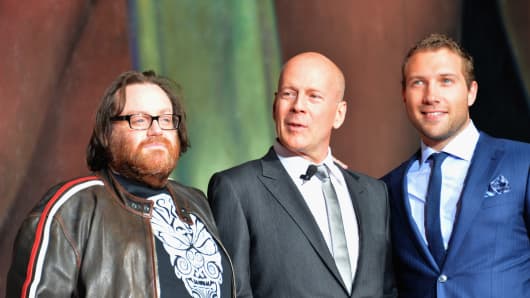A handful of other organizations and government agencies have bought ad slots before movies. Groups like the American Diabetes Association and the American Heart Associationhave run issue or brand awareness ads or commercials in theaters.
“This is the first time we’ve looked at movie trailers as a way to present an issue,” said Will Feltus, senior vice president for research at National Media, which bought the lawsuit campaign’s media time. The company, based in Alexandria, Va., was a media buyer for the 2004 Bush re-election campaign.
Mr. Feltus acknowledged being skeptical about such trailers because “they are a bit outside of the box,” but said that data from Scarborough Research, a major market research group, found that people who closely followed political issues were “well above average” in their moviegoing habits.
“About 50 percent are more likely to go to the movies six or more times a month,” he said. Also, movies are attracting bigger audiences, with box office results up 15 percent this year over 2008.
And 90 percent of audiences prefer preshow entertainment and advertising over a blank screen, according to E-Poll, a market research firm whose data is used by National CineMedia, which sells and places advertisements for Regal Entertainment, AMC Entertainment, Cinemark Holdingsand other theaters.
The message of the institute’s movie theater commercials is “hard-hitting,” said Cliff Marks, National CineMedia’s president for sales and marketing. “This isn’t making any bones about it. It’s not a warm and fuzzy message, but one that says: ‘you need to know there is a problem.’ ”
The ads also are staking out new advertising ground, because the campaign plans to go national and because of the ads’ longer running time, Mr. Marks said. “Such ads, which we call branded entertainment, are usually 30 or 60 seconds long. The lawsuit promotion is a longer form, and costs more to produce and buy the time,” he said.
The institute declined to disclose its budget for the campaign, but Mr. Marks said it would cost at least $1 million, and perhaps as much as $4 million, to place ads in its 1,325 theaters across the country.
The campaign is not pushing any specific legislation, but Joanne Doroshow, executive director of the Center for Justice and Democracy, a consumer advocacy group, said the chamber was trying to fend off legislative changes to mandatory arbitration clauses.
“They want to make sure that consumers don’t have the right to go to court when there are disputes in consumer contracts like health insurance, credit cards or mortgages,” she said.
Ms. Rickard said the institute would gauge the effectiveness of its campaign from the response to its Web site, facesoflawsuitabuse.org. As it plans to expand the campaign nationally, the institute is looking for new participants from the “hundreds of stories we get on our Web site,” said Bryan Quigley, a spokesman for the group.
Ms. Rickard said the public needed to be educated about such lawsuits because cases like the one involving the nesting goose were costly to business owners.
But Patrick Malone, former president of the Trial Lawyers Association of Metropolitan Washington, said the chamber was omitting “key facts that made these and other cases nonfrivolous.”
The goose at the center of the lawsuit “was not a wild creature, but a pet because they were feeding it,” Mr. Malone said. Campaigns like those from Ms. Rickard’s group amount “to mass tampering with the jury pool so they look at any plaintiff with a skeptical and jaundiced eye,” he said.


